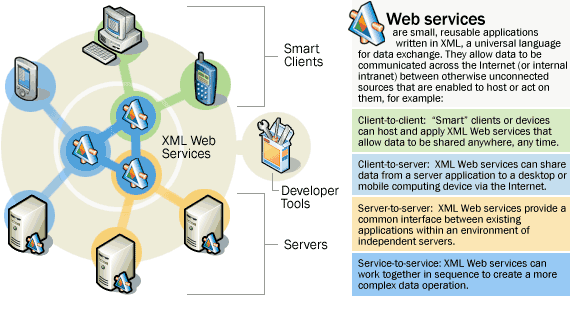

COM+
1. Scalability
- Any system must recycle resources quickly
and efficiently
- JIT/ASAP life cycle ensures all resources are recycled to
central resource pools at the end of a transaction
- COM+ Load Balancing service direct new clients to lightly
loaded servers
- Short component life spans are of great benefit
2. State Management
- "The process which maintains state and page
information over multiple requests. As is true for any HTTP-based technology,
Web Forms pages are stateless, which means that they do not automatically
indicate whether the requests in a sequence are all from the same client or
even whether a single browser instance is still actively viewing a page or
site. Furthermore, pages are destroyed and recreated with each round trip to
the server; therefore page information will not exist beyond the life cycle of
a single page" -- page state management from MSDN
- Provides data integrity by ensuring another transaction
cannot access data pertaining to one transaction until the first transaction
has completed
- Restrict to access application's data will limit
scalability
- All access to data must be performed explicitly by
component using a data access mechanism such as ADO (ActiveX Data Objects) or
OLE DB (Object Linking and Embedding DataBase)
// OleDbSample.cs
using System;
using System.Data;
using System.Data.OleDb;
using System.Xml.Serialization;
public class MainClass {
public static void Main ()
{
// Set Access connection and select strings.
string strAccessConn = "Provider=Microsoft.Jet.OLEDB.4.0;Data Source=..\\..\\BugTypes.MDB";
string strAccessSelect = "SELECT * FROM Categories";
// Create the dataset and add the Categories table to it:
DataSet myDataSet = new DataSet();
OleDbConnection myAccessConn = null;
myAccessConn = new OleDbConnection(strAccessConn);
OleDbCommand myAccessCommand = new OleDbCommand(strAccessSelect,myAccessConn);
OleDbDataAdapter myDataAdapter = new OleDbDataAdapter(myAccessCommand);
myAccessConn.Open();
myDataAdapter.Fill(myDataSet,"Categories");
myAccessConn.Close();
.......
3. Simpler Security
- Built on top of Windows 2000 security infrastructure and
original COM security mechanism
- A hierarchy of authentication levels
- Access control is defined on per-interface or per-method
- Role-based security to allow access right to be assigned to
named roles, such as "administrator"
- Some identity issues still remain, such as identity used to
access pooled resources
4. Fault Tolerance
- COM+ Component Load Balancing compensates for a server
failure by sending new clients to alternative servers
- Queued components can be delivered when the server is back
up -- for existing clients of the failed server
5. Ease of Development
- Components calls the SetComplete and SetAbort
methods to indicate a transaction outcome
- Call are available in COM-aware languages, such as VB,
VC++, and VBScript
- Existing COM components can be used as COM+ components
without recoding
| APL |
Fortran |
Pascal |
| C++ |
Haskell |
Perl |
| C# |
Java Language |
Python |
| COBOL |
Microsoft JScript® |
RPG |
| Component Pascal |
Mercury |
Scheme |
| Curriculum |
Mondrian |
SmallTalk |
| Eiffel |
Oberon |
Standard ML |
| Forth |
Oz |
Microsoft Visual Basic® |
6. Help With Deployment
- COM+ applications can be used from any COM-enabled platform
- COM+ server can only run on Windows 2000
- A COM+ application can be exported as a Windows installer
package

"In Visual Basic 6.0, you typically used the
Package and Deployment Wizard to create a script-based Setup.exe for your
application. The Package and Deployment Wizard could be run as a stand-alone
tool or as an add-in to Visual Basic; it could only be used with Visual Basic
projects.
In Visual Basic .NET, you use a deployment
project to create an installer (.msi file) for your application. Unlike the
script-based setups, the installer uses Microsoft Windows Installer technology
to manage the installation for you. For example, the installer automatically
rolls back installation when something goes wrong. " -- from MSDN

